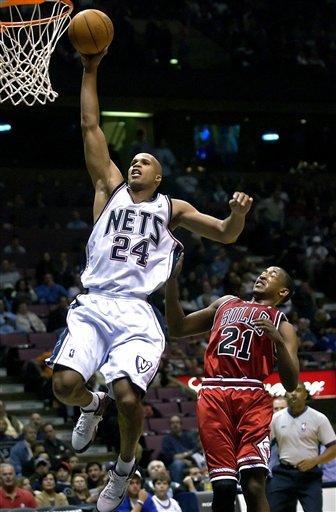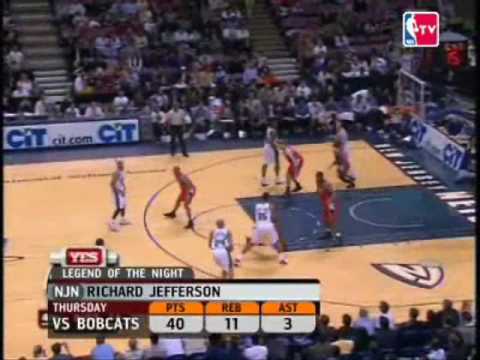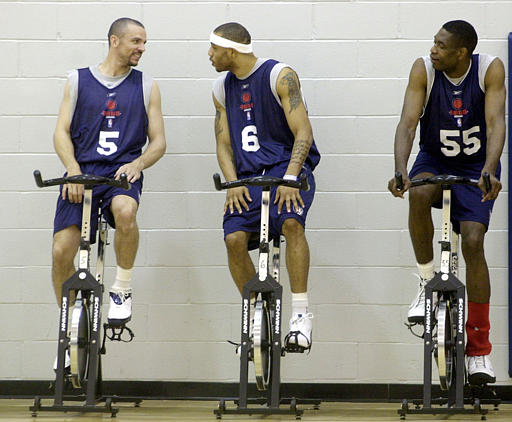
2003-2004 Stats: 78 GP, 39.2 MPG, 19.5 PPG, 6.8 RPG, 3.8 APG, 0.8 SPG, 0.2 BPG, 49.3 FG%, 31.9 3P%, 81.2 FT%
2003-2004 Advanced: 60.3 TS%, 52.2 eFG%, 18.9 PER, 117 ORtg, 104 DRtg, 11.7 WS
All-Star Team? No
Team: 49-33, lost in second round to Miami Heat (4-1)
Richard Jefferson scored 19.5 points per game in the 2005-2006 NBA season. This was during his reign as the starting small forward for the New Jersey Nets during the greatest stretch of success in franchise history. He was important to the team and was close to a very good player. He was a solid running mate for Jason Kidd on the fast break and could often hit an open shot when called upon. He could score upwards of 30 points on a given night and defend a good player if asked politely. Again, Richard Jefferson was a good, valuable basketball player for the New Jersey Nets.
Richard Jefferson was nothing more than this. He was never in the 90th percentile for any one basketball skill; he did not stand out in any way. He was also a player completely devoid of aesthetic. His game was clean, practical granite. It was an episode of “How It’s Made.” He was one of the few players for whom his initials truly were the only apt nickname. He was never actually an All Star, but damn did he earn that spot on the NBA All-Rookie Second Team. His middle name is Allen.
Even in this highlight video (the pragmatically titled “NJ Nets Richard Jefferson Mix”), the section dedicated to RJ’s performance in a college slam dunk contest features three pretty vicious dunks by some dude named Ronald Curry, and then half of one RJ dunk.
To be fair, it looked like it was going to be pretty tame.
Even the way he converted Jason Kidd’s sage lob passes, a skill that was perhaps his greatest contribution to Nets history, was pedestrian. While Kenyon finished alley oops like a feverish, violent storm surge and Vince was the one human being who could match Kidd’s stunning artistry with his own beautiful sky-high extemporization, Jefferson turned every transcendent lob into two simple, tidy points.
But at least he got those two points. He got them a lot and it helped the Nets win a lot of games. In this 2005-2006 season, for instance, Jefferson’s modest output was a large reason the Nets won 49 games. That’s a lot for the Nets! It was the best individual season submitted by Jefferson, but if you don’t vote for it, it will be forgotten forever. In fact, it will most likely be forgotten forever regardless because on the whole, it was nothing more than a better than average individual performance by a good player on a team that lost in the second round of the NBA playoffs. In terms of the NBA’s history, this is not all too noteworthy. Judged on the scale of all international human events, this barely registers. In the cosmic sense, this is so much less significant than a single grain of sand in the Sahara Desert that I’m embarrassed to have even introduced the Sahara Desert into this discussion. It was 78 games of Richard Jefferson whispering into the endless abyss. But it happened. It may be insignificant, but it is a thing that most definitely happened.
So: A vote for Richard Jefferson is a vote for being remembered after you’re gone, even if you didn’t change the world while you were here. It’s a vote for doing your job well, but not well enough to ever get your name in the paper. A vote for Richard Jefferson is a vote for the human condition. It’s a vote that salutes good work and absolutely nothing further. It’s a vote that stares straight into the face of oblivion and lets it be known that one day we will be gone, for all of eternity, but that at one point we were here. And, in some small, barely perceptible way, we made a tiny impact on the universal experience. We showed up, did what we could, and left. We will all disappear—every single one of us—but, god-willing and weather-permitting—one thing will remain: Richard Jefferson scored 19.5 points per game for the New Jersey Nets.
Next: Bernard King

















